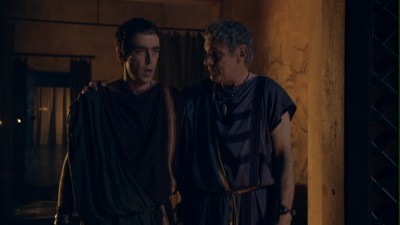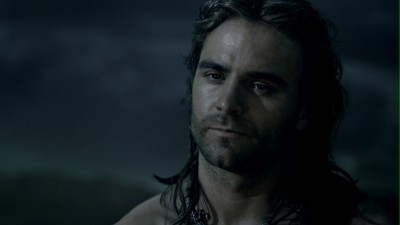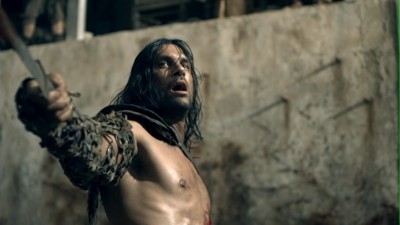| Reviews & Columns |
|
Reviews DVD TV on DVD Blu-ray 4K UHD International DVDs In Theaters Reviews by Studio Video Games Features Collector Series DVDs Easter Egg Database Interviews DVD Talk Radio Feature Articles Columns Anime Talk DVD Savant Horror DVDs The M.O.D. Squad Art House HD Talk Silent DVD
|
DVD Talk Forum |
|
|
| Resources |
|
DVD Price Search Customer Service #'s RCE Info Links |
|
Columns
|
|
|
Spartacus: Gods of the Arena
"Spartacus: Blood and Sand" was one of 2010's great television surprises. Initially looking like a cheap knock-off of "300," it soon established itself as a smart, well acted, viscerally entertaining piece of entertainment that defied conventions by knowing just how much to take itself seriously while not being too embarrassed to be over-the-top and sleazy. Two of the biggest revelations of "Blood and Sand" were John Hannah as Batiatus (more on him in a bit) and Andy Whitfield as Spartacus, an unknown actor at the time, who over the initial 13 episodes of the series made a steadfast march towards stardom, displaying a healthy balance of humanity and brutality, giving viewers a true hero to root for. Sadly, Mr. Whitfield was forced to pass the mantle to another actor as his ongoing bout with cancer proved to be too much to handle while shooting such a physically taxing series. In place of a second season, a six-episode prequel was commissioned, titled "Gods of the Arena," it would tell the tale of Batiatus' rise to power in Capua as well as provide much desired backstories for some of "Blood and Sand's" more memorable supporting characters. Sadly, "Gods of the Arena" as fantastic as it is, despite the presence of Andy Whitfield, arrives on DVD an even more bittersweet experience, as Whitfield lost his battle with cancer, passing away far too soon at the age of 39. However, Whitfield gave his full support behind his replacement for the second season of "Spartacus" and frankly, "Gods of the Arena" should be enjoyed as it respectfully continues the quality, often guilty-pleasure entertainment, Whitfield and others helped make a smash hit in the first place.
While, a prequel in nature, "Gods of the Arena" begins where "Blood and Sand" left off, so new viewers take heed and leave this title be until you're caught up, otherwise face having the many twists and shocking revelations of "Blood and Sand" spoiled. That said, "Gods of the Arena" manages to shake off many issues inherently present in prequels, but falls victim to a few nearly unavoidable ones. Without Spartacus to focus on, a new hero must step forward and "Gods of the Arena" provides two. First up is perhaps the most fearsome and brutal gladiator to enter the "Spartacus" mythos, Gannicus (Dustin Clare), a practically unstoppable warrior whose boredom with low-level fights results in him toying with opponents, grandstanding, and ultimately taking a lax attitude towards training. Clare steps up to the task of giving a hero viewers can cheer for, bringing a level of humanity to the character that echoes Whitfield's own talents in "Blood and the Sand." Gannicus' quieter moments come in private conversations with his friend, fellow champion, Oenomaus (Peter Mensah), who viewers will surely recognize as "Blood and Sand's" head trainer, Doctore. The inclusion of a pre-Doctore Oenomaus, is a stellar example of the little character details "Gods of the Arena" is able to provide.

Also returning are Manu Bennett as Crixus, Spartacus' main rival throughout "Blood and Sand," however here, Crixus finds himself a newly purchased slave and raw gladiatorial talent, making his attitude toward the brash Spartacus resonate with greater meaning. Bennett really puts in overtime playing a character we know, but don't fully recognize as first. As his story progresses, "Gods of the Arena" manages to nicely fit in backstories for Ashur (Nick Tarabay), who has yet to become the crippled Assassin for Batiatus and Barca (Antonio Te Maioha), one of "Blood and Sand's" more pleasant supporting surprises. Added to the chaos of the arena, is Batiatus' current Doctore, a much welcome Temuera Morrison, once again showing off his underrated skills as a brutish thinking man.
As fascinating as the politics of the arena and training grounds are, what likely has fans checking the series out is John Hannah and Lucy Lawless as Batiatus and Lucretia, respectively. "Gods of the Arena" is truly their show, giving Hannah and Lawless free range to go over-the-top without once losing credibility. While "Blood and Sand" was firmly the story of Spartacus' rise in the gladiator circuit, "Gods of the Arena" is the tale of Batiatus' entry into the big time fights and his first step into the web of Roman politics that came as a shock in the preceding series. Hannah firmly sheds any mainstream association with his goofy sidekick roles in "The Mummy" films and every moment of his screen time is a treat as the writers up the ante on the absurd and profane statements spilling from his mouth, that only Hannah seems to be able to make sound Shakespearean. Likewise, Lawless is as over-the-top, but not as blatantly animated as Hannah and there is no question her character's true love for her husband despite known infidelities, as Lucretia positions herself as a deadly Roman viper, refusing anyone stand in the rise of Batiatus.

On the downside, "Gods of the Arena" introduces some new characters, namely Batiatus' father (Jeffrey Thomas) and Oenomaus' wife Melitta (Marisa Ramirez) whose fates are probably easily guessed by their obvious absence from the previous series. That's not to say every new character in "Gods of the Arena" leaves a corpse, the reality is quite the opposite. The events set-up here will have ramifications that will continue throughout the series, but whether the writers act on that and elevate some inclusions beyond the level of plot contrivances remain to be seen. Ultimately, a few characters, namely Melitta come off as more necessary evils than flesh and blood characters we should emotionally invest our selves in. Not a knock against any actor, but a definite case of justified finger pointing at writers.
Likewise, the phrase "less is more" could definitely be examined by the writers as "Gods of the Arena" amps up the "mature" aspect at least three-fold in all categories. The dialogue is more profane (but not at the expense of being less smart), the nudity is laughable, and the violence give many video games and comics a run for their money; on a serious note, I feel obligated to warn that the series has an awful mean streak towards not only its male characters but its women and while historically and from a storytelling angle, it's not entirely exploitative, it does reach some points where it's impossible not to cringe. While the refining (and in many cases exclusion) of the CGI gore was welcome, some "gags" feel like insults to an audience who isn't watching the series for the sheer shock value any more. The slow-mo blood sprays begin to grow tiresome by the end of the second episode and by the time the nearly 30-minute action packed final act of the series rolls around, viewers are firmly desensitized to the spectacle and as a result, the writers are "forced" to invent some truly gruesome acts of violence to keep the lethality of the arena in our minds. In doing so, they cheapen the astonishing physical conditioning and athleticism of the cast, pushing their practical stunt work to the background far too often. It's by no means a deal breaker, but if such behavior continues throughout the upcoming full season of the series, the writers better be in top form to compensate.

Fans of "Blood and Sand" should be entirely pleased by this solid prequel to pass the time until the next season in Spartacus' tale can unfold. Those like myself who couldn't get enough of John Hannah in the debut season will find this series criminally brief. Despite running roughly five and a half hours in length, one could easily make it through in a single setting as the narrative is brilliantly paced and incredibly compelling. On a personal note, finishing this review and reading the news of Andy Whitfield's passing did leave me with a great sadness at the loss of a promising talent as well as a little guilt at being entertained by a series that would have never existed had it not been for his poor health. However, as said before, "Gods of the Arena" is a fitting tribute to Whitfield's work proving the creative team refuses to let quality dip and tarnish the work Whitfield and the rest of the premiere series cast worked so hard on. The crime isn't in enjoying "Gods of the Arena," it's ignoring it in the first place.
THE DVD
The Video
The 1.78:1 anamorphic widescreen transfer is perfectly stunning. As with "Blood and Sand," "Gods of the Arena" is reference quality with rich, consistent color, strong, realistic detail, and not a hint of detracting technical glitches. The unique visual look of the series is captured without fail and the stronger CGI no longer feels like a cartoonish overlay, making "Gods of the Arena" at the very least a visual treat.
The Audio
The Dolby Digital English 5.1 audio track is expertly balanced with distortion free dialogue, a musical score that enhances, and effects work that puts you in the middle of the action. There's greater range to the sound mix and as visceral as the fights are, the audio keeps up, lending a much-appreciated kick to the viewing experience. Spanish subtitles and English subtitles for the hearing impaired are included.
The Extras
Sadly, unlike "Blood and Sand" all commentary tracks have become Blu-Ray exclusives, leaving this DVD offering with a smattering of bonus features that are never that substantial. "Starz Studios: Gods of the Arena" is the only bonus running over the 10 minute mark, but is little more than a promotional behind-the-scenes overview of the prequel series. The remaining extras are split between informative ("Weapons of Mass Disruption," "Battle Royale: Anatomy of a Scene," "Post Production: The Final Execution," " Enter the Arena: Production Design," and "Dressed to Kill) and fun but disposable ("10 Easy Steps To Dismemberment," "On Set With Lucy Lawless," "Convention Panel (a Q&A highlight reel, truly wasteful)," and "Arena Bloopers." While adding up to a decent investment of time, all would have been gladly sacrificed for one or two solid commentary tracks.
Final Thoughts
"Spartacus: Gods of the Arena" isn't better than "Blood and Sand," but it comes awfully close. With only six episodes to lay things out and the prequel nature of the storytelling, it's obviously has a little less emotional kick to it, but the writing team has more than a few tricks up their sleeves and deserve commendation for introducing fans to Gannicus, who without hesitation I would put high on my list of favorite characters. "Gods of the Arena" works best when giving key members of "Blood and Sand's" supporting cast room to flesh out their performances, which should lead into a better second season in all aspects. The masterful technical presentation coupled with John Hannah making what could easily be defined as camp carry meaning and believability make "Gods of the Arena" earn its high praise. Highly Recommended.
|
| Popular Reviews |
| Sponsored Links |
|
|
| Sponsored Links |
|
|
| Release List | Reviews | Shop | Newsletter | Forum | DVD Giveaways | Blu-Ray | Advertise |
|
Copyright 2024 DVDTalk.com All Rights Reserved. Legal Info, Privacy Policy, Terms of Use,
Manage Preferences,
Your Privacy Choices | |||||||














